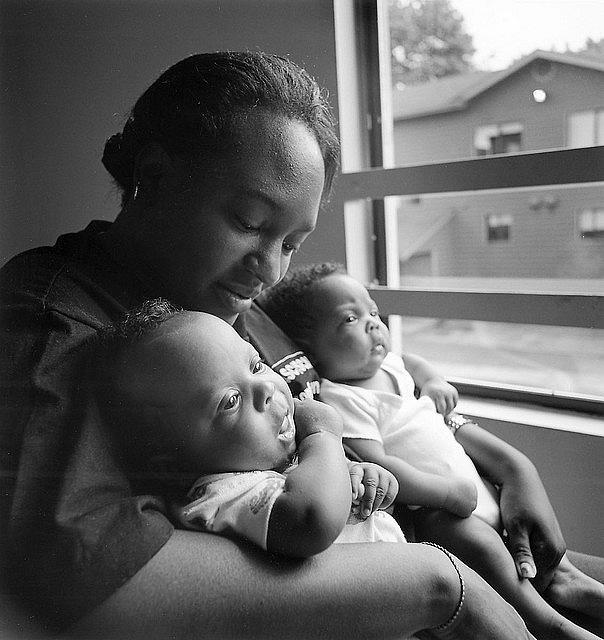The mental health of fatherless black boys: A community concern

My cousin Charles was a tap phenom. He performed in shows all over Chicago and even did a little traveling. He was also in the Chicago Children’s Choir and one year was named grandmaster of the Bud Billiken Parade, the largest and oldest African American parade in the United States. Charles worked hard enough to become an Eagle Scout, the highest Boy Scout ranking, in which a young scout has to “fulfill requirements in leadership, service and outdoor skills.”
Charles grew up on the south side of Chicago, in the famed Bronzeville neighborhood. Though his father was absent due to an untimely death, he was raised in a home with three strong black women including my aunt, who is a longtime Chicago judge, my grandmother, who was a nurse for more than three decades and another aunt who was a corporate executive for many years.
By all accounts Charles should have been a success – middle-class upbringing, positive extracurricular activities and a Boy Scout. His future was bright. The opportunities were endless. He certainly had a leg up on other young African American boys his age in Chicago.
Instead Charles ended up in the criminal justice system, a long fall for an Eagle Scout.
Today Charles is 31 years old, unemployed and living with my grandmother and aunts. He spends his days sleeping and watching Joel Osteen sermons.
So what happened to Charles? What did he need that three strong black women couldn’t give him?
So what happened to Charles? What did he need that three strong black women couldn’t give him?
“I believe that the absence of the black male in the household is profound in its impact on our children and on our young men in particular,” said David Banks, founding principal of the Eagle Academy for Young Men, an all-boys public charter school in the Bronx, New York, that serves predominantly African American and Latino boys. “The sons act out even more as they get older without the presence of a strong, responsible father figure in the home.”
I interviewed Banks four years ago for a story on schools that are succeeding in educating at-risk and vulnerable populations. Banks said then that starting around the fourth or fifth grades, black boys go from huggable and cute to scary and threatening.
“All of a sudden you’re looking at these black boys as they are getting bigger, angry often times because dad is not around, mom is overwhelmed,” said Banks in the interview. “In the absence of having responsible adults, particularly responsible men, it’s really hard for young men to navigate this thing we call life. Their mom is doing everything she can. Auntie is there. Grandma’s there. But the older they get, the harder it is for that to hold them. It holds many of them. But for far too many of our young men, that’s not enough.”
In many instances, fatherless boys are finding role models in those they see on the streets, including gang leaders and drug dealers, notes Banks. This could lead to delinquent behaviors such as dropping out of school, drug use and crime.
Studies, including work by Sara McLanahan of Princeton University, have found that a father’s absence lowers school attendance, increases anti-social behavior and reduces a child’s chances of future employment.
In an investigative series for the 2015 National Health Journalism Fellowship, I will examine the mental and emotional impact of fatherlessness on African American boys. I will explore how not having a father in the home may cause behavior problems in school. I will look at the District of Columbia’s current decision to create a boys’ school and what the District can learn from other boys’ schools around the country that have successfully educated black boys, including the Eagle Academy in New York and Urban Prep in Chicago.
Another piece will focus on programs that address the needs of fatherless black boys including the group Life Pieces to Masterpieces, a D.C.-based organization that serves young African American boys in D.C.’s most impoverished neighborhoods. It will look at different approaches that help young men deal with the emotional trauma of having an absent father. And lastly, the series will profile successful African American men who grew up without fathers. What was the key to their success? What helped them overcome life’s challenges and obstacles?
The goal of course is to find solutions to what is ultimately a significant community health problem. When the emotional and mental needs of fatherless young blacks boys are addressed, there’s an opportunity to decrease the high school dropout rate, joblessness and incarceration across the nation.
Banks of the Eagle Academy described the crisis of young men of color as a “disaster of epic proportions.”
“Young men are not graduating from high school,” Banks said. “They’re not going off to college. They are not making themselves available for any serious career opportunities because they got stuck at the first step,”
My cousin Charles is still struggling to get unstuck.
[Photo by Seattle Municipal Archives via Flickr.]

